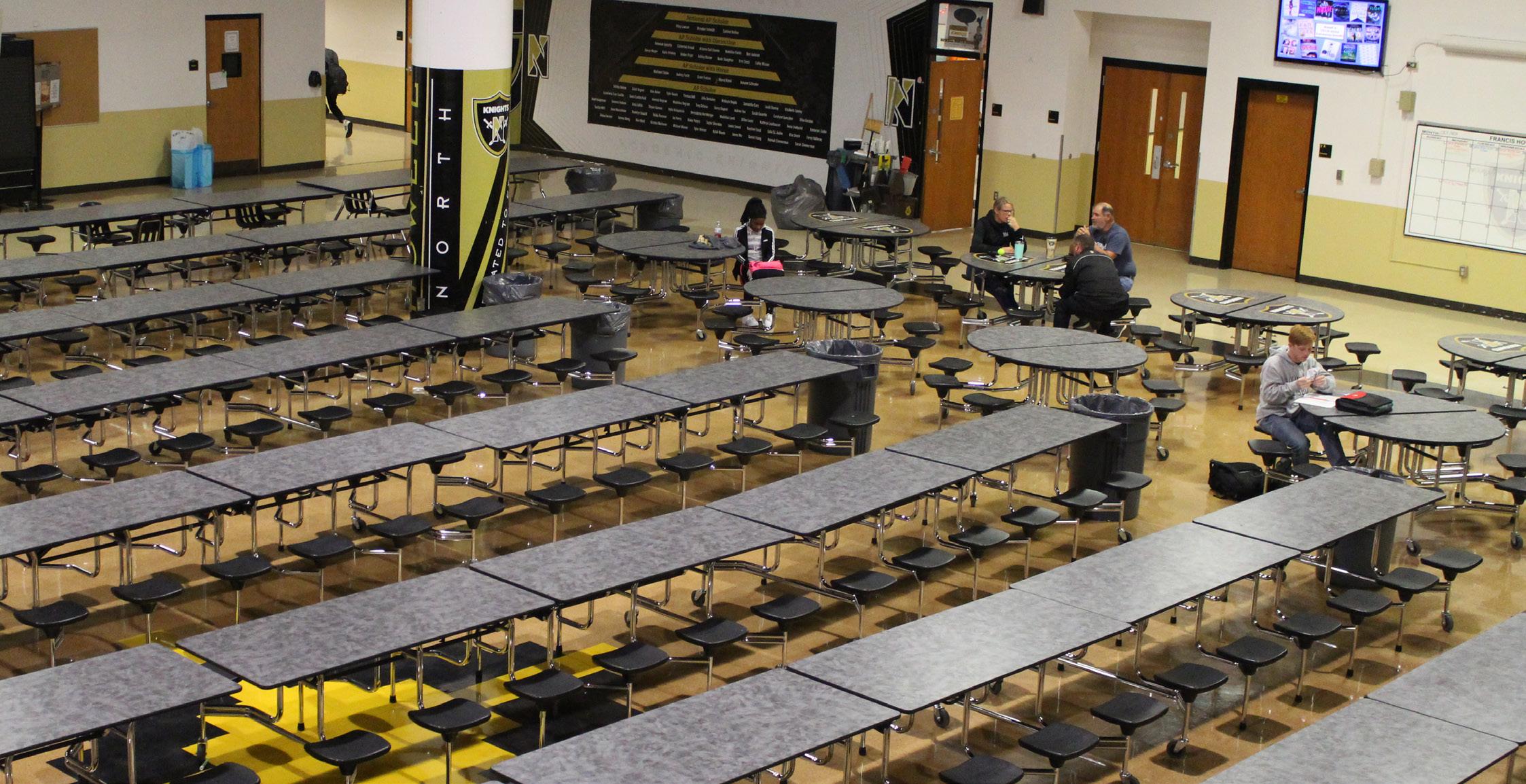
6 minute read
Changes for FHSD
FHN faculty and students eat in the lunchroom every day for lunch. Lunch tables were purchased last year as an improvement to the school. Superintendent Mary Hendricks-Harris and Principal Nathan Hostetler worked together to purchase new tables for the lunchroom. (Photo by Adam Hogan)
PLANS TO IMPROVE FACILITIES The FHSD school board makes new plans for facility renovations within the district and budgets their money for it
FHSD’s superintendent Mary Hendricks-Harris will retire after the 2019-20 school year after working in the district for years. In her final few months, she is pushing for an improvement of facilities in the school district in order to create lasting physical change that can assist in the learning of students through creating a healthy, safe academic environment.
“Our current strategic plan calls for safe, secure, well-maintained and equitable facilities that meet the needs of 21st century learners,” Hendricks-Harris said. “All bond issues, including a new FHN, would be aligned with this goal.”
Earlier this year, the FHSD School Board met to discuss the projects that will go into the improvement of the schools in the district and what it will cost. The session’s agenda contained discussion of fiscal responsibility and school policy reviews before they entered into a work session about the bond issue, which is the facility improvement discussion. There is a current debate on when this issue will run, but Hostetler said rough plans were for either April or November of 2020.
The school board conducted a survey among FHSD employees, parents and people living in the community surrounding the district. Survey questions included questions inquiring about the observed condition of the facilities, the prioritization of certain renovations and the support behind the proposed bond issue.
While none of the people surveyed said that the district’s facilities were in bad condition, 12.90% said they were in poor condition, 48.39% said it was in average condition, and 38.71% said they were in good condition. In the end, facilities could be improved in order to contribute to the improved learning environment. According to head principal Nathan Hostetler, the main concern at FHN is the messy HVAC systems and leaks due to roofing problems, and the rifts between the roof panels. “We are the oldest building, so a lot of our stuff is beginning to age,” Hostetler said. “We have approximately 50,000 fewer square feet than the other two [FHSD high schools]. And honestly, the HVAC and roofing are going to be significant issues moving forward.”
53.33% of people surveyed said they would strongly support the bond issue if it was $250 million and resulted in no tax increase. No one said they would strongly oppose. A common theme among responses on why the bond issue should be supported was that the facilities FHSD currently works with are outdated and need innovation. Many responses stress the necessity of updates. Building envelope, utilities, and updates were considered highest priority according to the survey, while safety systems were runner up.
Of the proposed $250 million, current improvements to FHSD facilities to satisfy these priorities would cost approximately $66,840,000. Elementary schools will cost the most money for the district, mainly requiring HVAC modernization and exterior improvements, while the minor updates in the high school category would cost the least due to a smaller amount of schools, aside from the cost of building a new building for FHN. For some time now, talk has gone around about the creation of a new FHN to replace the current one, and this is estimated to become a reality within the next three to four years, and will be built close to Henderson Elementary School. This project is high on the School Board’s priority list, according to Hostetler. The pre-construction cost estimate is $86,350,000. The building of a new FHN has raised concern among the people responding to the school board’s survey, mentioning that the school may need a remodel but do not see it necessary to build an entirely new facility.
“If North is going to be in the same place in terms of physical plant as the other two buildings, then this one really does need to be replaced,” Hostetler said. “It really is time for this. It’s not like the building’s falling down around us, but it’s time.” by Ashlynn Perez ashlynnkaeperez@gmail.com
MORE INFO Below is a survey conducted by the school board on the bond issues : bit.ly/2p1Bh52

STUDENTS’ TAKE:
How do you feel about people being able to retake the ACT in sections?
“I think it’s good. You can focus on the areas that you need to fix but at the same time I don’t like the ACT because a student shouldn’t be judged by one test. ”
Grace Moseley, 11
CHANGING RETAKES
Students retaking ACTs will soon have the opportunity to retake sections of the ACT rather than retake the entire test all over again
The American College Testing (ACT) organization announced a new change to the ACT that will be put into place at the end of next year.
In the past, students wanting to retake the ACT would have to retake the entire test. This means if a student were to do poorly in one section of the ACT in contrast to how they performed on the other three sections, they would still have to retake four sections math, science, reading and writing - in order to improve their grade on that one section.
“From what I understand is that students are allowed to retake certain subjects,” Patty Bartell, a math teacher at FHN, said. “They can retake math or they can retake the English part of the ACT [and so on].”
Some sophomores were allowed to take the ACT in seventh grade because of their Measures of Academic Progress (MAP) Test scores from that year. Some underclassmen who have taken the ACT for JBA and Missouri Scholars are planning on retaking it. With underclassmen aware of this change, some may feel more hopeful towards having to take the ACT next September when the change is put into play.
“I feel like it’s a really good system because if you don’t fail the whole test you shouldn’t have to retake the whole test- there’s no purpose for it,” sophomore Kaylie O’Dell said. “It’s time. It’s a four-hour test, so if you only failed one section and you have to take the test again, that’s four hours of wasted time and if you get a worse score for a different section that doesn’t make any sense because you already got your score.” The ACT is $68 including the written portion. Although it is not yet confirmed, some believe that having to retake individual sections is going to be significantly cheaper than having to pay $136 combining the cost of the first ACT attempt and the retake when only one section needed to be retaken. In some cases it is too great of a financial strain on some families, especially when students have to pull that money out of their own pockets. This can also be stressful for students receiving private tutoring.
“Instead of paying $60 I would hope that it would be cheaper to just take the one part,” junior Olivia Neunaber said. by Liy Taliaferro liytaliaferro@gmail.com | @liy.leee
Upcoming ACT Dates December 14, 2019 February 8, 2020 April 4, 2020 June 13, 2020 July 18, 2020 “I think it gives kids a chance to improve in certain areas at different times. ”
Joey Wallace, 11
“It would give kids a break to switch gears to the next subject first. ”
Jeremiah Meador, 12
“It makes it easier to take more time on the sections that affect their future career goals. ”
Madi Molle , 11
“I think it’s a really, really good thing. It gives you the whole time to just focus on just one section and [do] a lot better on just that one section.”
Caroline Mitchell, 11










